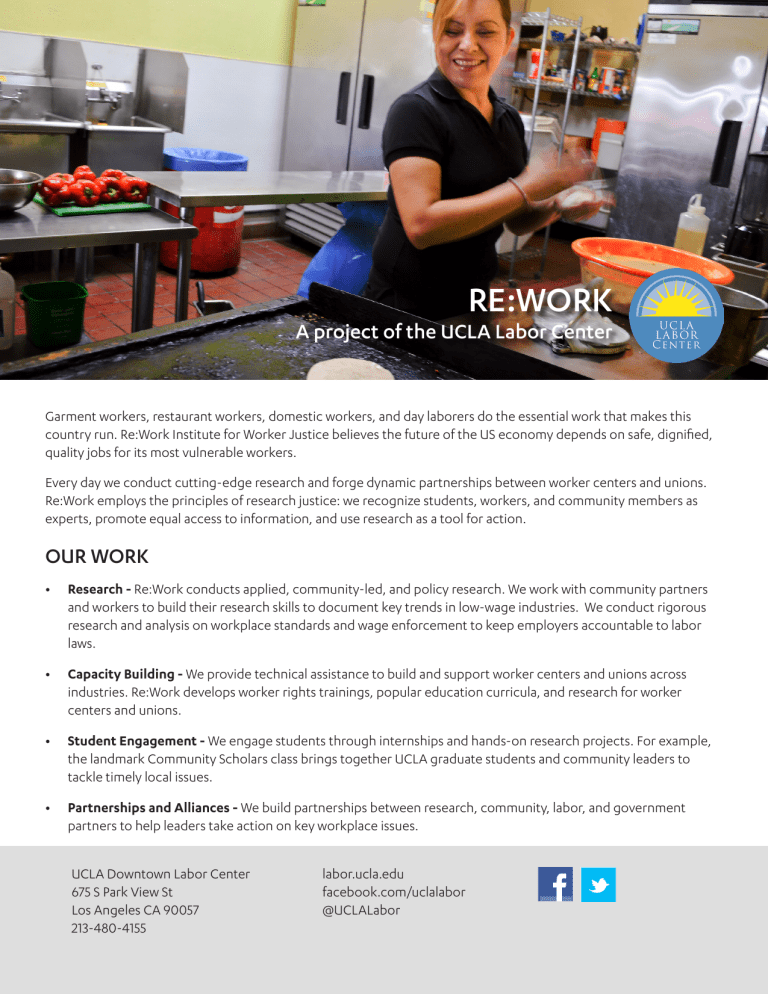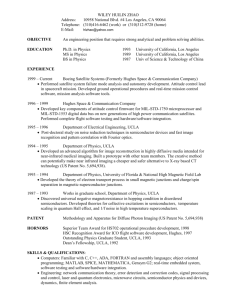ReWork Institute for Worker Justice One

RE:WORK
A project of the UCLA Labor Center
Garment workers, restaurant workers, domestic workers, and day laborers do the essential work that makes this country run. Re:Work Institute for Worker Justice believes the future of the US economy depends on safe, dignified, quality jobs for its most vulnerable workers.
Every day we conduct cutting-edge research and forge dynamic partnerships between worker centers and unions.
Re:Work employs the principles of research justice: we recognize students, workers, and community members as experts, promote equal access to information, and use research as a tool for action.
OUR WORK
• Research - Re:Work conducts applied, community-led, and policy research. We work with community partners and workers to build their research skills to document key trends in low-wage industries. We conduct rigorous research and analysis on workplace standards and wage enforcement to keep employers accountable to labor laws.
• Capacity Building - We provide technical assistance to build and support worker centers and unions across industries. Re:Work develops worker rights trainings, popular education curricula, and research for worker centers and unions.
• Student Engagement - We engage students through internships and hands-on research projects. For example, the landmark Community Scholars class brings together UCLA graduate students and community leaders to tackle timely local issues.
• Partnerships and Alliances - We build partnerships between research, community, labor, and government partners to help leaders take action on key workplace issues.
UCLA Downtown Labor Center
675 S Park View St
Los Angeles CA 90057
213-480-4155 labor.ucla.edu
facebook.com/uclalabor
@UCLALabor
ISSUE AREAS
Re:Work addresses issues related to quality jobs, economic equality, and the impact of work on families and communities.
Current projects address:
• working conditions in low-wage industries, such as garment, domestic work, taxi, restaurant, and construction;
• worker center development and partnerships with unions;
• labor laws and enforcement;
• immigrant workers;
• incarceration and employment; and
• the future of work in a changing economy.
Wage Theft
Wage theft occurs when employers commit basic labor laws violations, such as failure to pay minimum wage and overtime, or forcing workers to work through meal and rest breaks or “off-the-clock” without payment. Re:Work assesses the impact of wage theft on local economies, partners with local and statewide organizations and agencies to propose policy solutions, and develops worker rights informational materials.
Young Workers
UCLA students lead the the way in an ongoing participatory research project to survey young workers across Los Angeles
County about their working experiences. As young workers themselves, students conduct the research and develop quantitative and analytical research skills. Far from privileged
“millennials,” young workers comprise a core part of the economy and face extensive challenges as the job market rapidly changes.
Parent Worker Project
Re:Work partners with Building Skills Partnership and SEIU-
United Service Workers West to train a cadre of parent worker leaders to become advocates in their children’s education.
This is the first program to address the education system with parents where they spend the majority of their time—at work.
KEY PUBLICATIONS
2015. “Hanging by a Thread! Los Angeles
Garment Workers’ Struggle to Access Quality
Care for their Children.” UCLA Labor Center,
Garment Workers Center, and Research
Action and Design.
2015. “Los Angeles Rising: A City that Works for Everyone.” Economic Roundtable, UCLA
Labor Center, and UCLA Institute for Research on Labor and Employment.
2014. “Health Impact Assessment of the Proposed Los Angeles Wage Theft
Ordinance.” UCLA Labor Center and Human
Impact Partners.
2014. “Orange County on the Cusp of
Change.” UCLA Labor Center.
2014. “Exploring Targeted Hiring: An
Assessment of Best Practices in the
Construction Industry.” UCLA Labor Center.
2013. “Hollow Victories: The Crisis of
Collecting Unpaid Wages for California’s
Workers.” National Employment Law Project and UCLA Labor Center.
2010. “Wage Theft and Workplace Violations in Los Angeles: The Failure of Employment and Labor Law for Low-Wage Workers.” UIC
Center for Urban Economic Development,
National Employment Law Project, UCLA
Labor Center, and UCLA Institute for Research on Labor and Employment.
2009. “Broken Laws, Unprotected Workers:
Violations of Employment and Labor
Laws in America’s Cities.” UIC Center for
Urban Economic Development, National
Employment Law Project, and UCLA Institute for Research on Labor and Employment.


